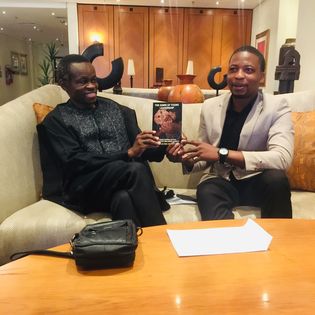
Patrice Émery Lumumba, born Isaïe Tasumbu Tawosa, was a Congolese politician and independence leader who served as the first prime minister of the Democratic Republic of the Congo from June until September 1960, following the May 1960 election. He was the leader of the Congolese National Movement (MNC) from 1958 until his death in January 1961. Ideologically an African nationalist and pan-Africanist, he played a significant role in the transformation of the Congo from a colony of Belgium into an independent republic.

The Patrice Lumumba Peoples' Friendship University of Russia, also known as RUDN University and until 1992 and after March 2023, as Patrice Lumumba University in honour of the Congolese politician Patrice Lumumba, is a public research university located in Moscow, Russia. It was established in 1960 by a resolution from the Central Committee of the CPSU and the Council of Ministers of the USSR to help nations to assist countries that had recently achieved independence from colonial powers. The university also acted to further Soviet foreign policy goals in nonaligned countries.

Lumumba is a 2000 biographical film directed by Raoul Peck. A co-production of France, Germany, Belgium, and Haiti filmed in French, the film depicts the rise and fall of Patrice Lumumba, and is set in the months before and after Congo-Léopoldville achieved independence from Belgium in June 1960. Political unrest in the Democratic Republic of the Congo at the time of filming caused the film to be shot in Zimbabwe and Beira, Mozambique. The film received positive reviews from critics, and won awards from the American Black Film Festival, the Political Film Society, and the Panafrican Film and Television Festival of Ouagadougou.

The Congolese National Movement is a political party in the Democratic Republic of the Congo.
Macenta is one of fourteen cities in the country of Guinea, West Africa, in the south of the country. It is the capital of the Macenta Prefecture, the Nzérékoré Region situated in the southeastern border of the country.

Souleymane Cissé is a Malian film director, regarded as one of the first generation of African filmmakers. He has been called "Africa's greatest living filmmaker" while his film Yeelen has been called "conceivably the greatest African film ever made."

Pierre Mulele was a Congolese rebel active in the Simba rebellion of 1964. Mulele had also been minister of education in Patrice Lumumba's cabinet. With the assassination of Lumumba in January 1961 and the arrest of his recognised deputy Antoine Gizenga one year later, Mulele became one of the top Lumumbists determined to continue the struggle. He went to Cairo as the representative of the Lumumbists' Congo National Liberation Committee based in Brazzaville. From Cairo he proceeded to China in 1963 to receive military training, and also took a group of Congolese youths with him, who received training in guerrilla tactics. Mulele was lured out of exile after Mobutu Sese Seko promised him amnesty, but Mobutu had him tortured and executed after Mulele returned to the Congo. He was a member of the Bapende ethnic group.
Ludo De Witte is a Belgian sociologist, writer, and political activist internationally known for his book The assassination of Lumumba, on the murder of Patrice Lumumba. In his latest work, Als de laatste boom geveld is, eten we ons geld wel op: kapitalisme versus de aarde, De Witte promotes eco-socialism, stating that to save the world from ecocide, it and its people must be freed from the yoke of capitalism. De Witte also advocates a close cooperation between red and green in their mutual anti-capitalistic fight to save the planet from its demise.

The Republic of the Congo was a sovereign state in Central Africa, created with the independence of the Belgian Congo in 1960. From 1960 to 1966, the country was also known as Congo-Léopoldville to distinguish it from its northwestern neighbor, which is also called the Republic of the Congo, alternatively known as "Congo-Brazzaville". In 1964, the state's official name was changed to the Democratic Republic of the Congo, but the two countries continued to be distinguished by their capitals; with the renaming of Léopoldville as Kinshasa in 1966, it became also known as Congo-Kinshasa. After Joseph Désiré Mobutu, commander-in-chief of the national army, seized control of the government in 1965, the Democratic Republic of the Congo became the Republic of Zaire in 1971. It would again become the Democratic Republic of the Congo in 1997. The period between 1960 and 1964 is referred to as the First Congolese Republic.
The Congo, short for the Democratic Republic of the Congo, is an equatorial country located in central Africa. As of July 2018, the CIA World Factbook lists the Congo containing over 85 million inhabitants representing over 200 African ethnic groups. French is the country's official language, and Catholics comprise the largest religious group at fifty percent. The Congo was colonized by King Leopold II of Belgium in 1885, and known as Belgian Congo until it gained independence. Both the Soviet Union and United States had kept a close watch on the mineral-rich country until on June 30, 1960, the Congo finally gained independence under the democratically elected Prime Minister Patrice Lumumba. Lumumba was a charismatic nationalist who led the only party in parliament with a nationwide base, rather than a regional or ethnic base.

The Martyrs Bridge of Bamako, Mali connects the older sections of the city to its suburbs on the south shore of the Niger River. One of three road bridges across the Niger at Bamako, it is also known as the "Old Bridge". Opened in 1957 when Mali was under French colonial rule, it was renamed the Martyrs Bridge in 1991 following the deaths of protesters against the rule of Moussa Traoré. Martyrs Bridge connects two of the main avenues of the city. Avenue Fleuve, a broad boulevard enclosing the Square Lamumba which runs north towards the Presidential palace. From the south of the bridge runs Avenue de l'Unite Africain, the major route from the city centre south to Bamako-Senou Airport.

Patrick Loch Otieno Lumumba is a Kenyan lawyer and activist. He is the director of the Kenya School of Law and served as the director of the Kenya Anti-Corruption Commission from July 2010 to August 2017.
The following lists events that happened during 1960 in the Republic of the Congo (Léopoldville).
The Embassy of France in Bamako is the diplomatic mission of France to Mali. It is in Patrice Lumumba Square in Bamako, the capital of Mali. In 2022, Joël Meyer, the French ambassador to Mali, was expelled by Mali for diplomatic reasons.

Thomas Rudolphe Kanza or Nsenga Kanza was a Congolese diplomat. He was one of the first Congolese nationals to graduate from a university. From 1960 to 1962, he served as the Democratic Republic of the Congo 's first ambassador to the United Nations and from 1962 to 1964, was a delegate to the United Kingdom. His opposition to the governments of Moïse Tshombe and Joseph-Désiré Mobutu led him to first rebel and ultimately flee the Congo. He returned in 1983, and resumed politics. From Mobutu's ousting in 1997 until his own death, Kanza served in diplomatic roles for the Congo.
Maurice Mpolo was a Congolese politician who served as Minister of Youth and Sports of the Republic of the Congo in 1960. He briefly led the Congolese army that July. He was executed alongside Prime Minister Patrice Lumumba in Katanga in 1961.
The following is a timeline of the history of the city of Bamako, Mali.
Joseph Bonaventure Lutula La Puku Pene Omasumbu was a Congolese politician who served as Minister of Agriculture of the Democratic Republic of the Congo in 1960. He reassumed the post in 1961 and held it until April 1963, when he was appointed Minister of Middle Classes and Community Development. He resigned from the government that September. He died in 2008.
Joseph Mbuyi was a Congolese politician. He served as the Minister of Middle Classes of the Republic of the Congo in 1960.

The Limete Tower is a tower located in the commune of Limete in Kinshasa, the capital city of the Democratic Republic of the Congo.









